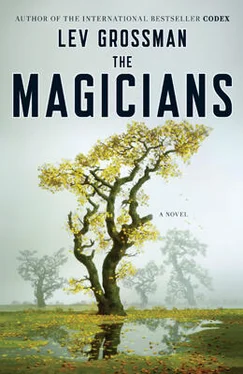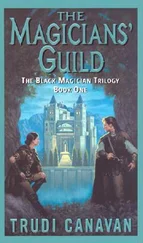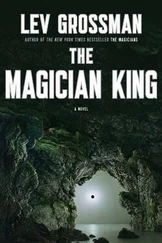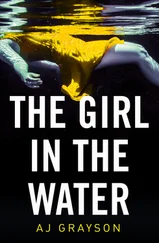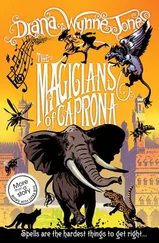If he was feeling daring, he thought about the time he’d spent as a goose flying south, wingtip to wingtip with Alice, buoyed up by pillowy masses of empty air, gazing coolly down at looping, squiggly, switchbacked rivers. If he did it now, he thought, he would remember to look out for the Nazca Lines in Peru. He wondered if he could go back to Professor Van der Weghe and have her change him back, and he would just stay that way, live and die as a stupid goose and forget that he’d ever even been a human. Sometimes he thought of a day he’d spent with Alice on the roof of the Cottage. They had a joke that they were going to play on the others when they got back from somewhere, but the others never came home, and he and Alice had just lain up there on the warm shingles all afternoon, looking at the sky and talking about nothing.
A few days of this went a long way. His body was healing fast and getting restless, and his brain was waking up and needed new diversions to distract it. It wouldn’t leave him alone for long.
Onward and upward. He couldn’t stop himself from getting better. Soon Quentin was out and about and exploring the grounds, a walking skeleton. Severed from his past, and from everything and everyone he knew, he felt as insubstantial and semi-existent as a ghost. The monastery — the centaur name for it was the Retreat — was all stone colonnades and towering trees and wide, well-maintained paths. Despite himself, he was ravenously hungry, and although the centaurs were strict vegetarians they turned out to be wizards with salad. At mealtimes they set out huge heaping wooden troughs full of spinach and lettuce and arugula and sharp dandelion greens, all delicately oiled and spiced. He discovered the centaur baths, six rectangular stone pools of varying temperatures, each one large enough that he could do three long, deep breatstrokes from one edge to the other. They reminded him of the Roman baths in Alice’s parents’ house. And they were deep, too: if he dove in and kicked downward with enough vigor, until the light dimmed and his hindbrain complained and the water pressure forced its fingers into his ears, he could still just barely brush the rough stone bottom with his fingers.
His mind was an icy pond constantly in danger of thawing. He trod on it only lightly — its surface was perilously slick and who knew how thin. To break through would mean immersion in what was below: cold, dark anaerobic water and angry, toothy fish. The fish were memories. He wanted to put them away somewhere and forget where he’d put them, but he couldn’t. The ice gave way at the oddest moments: when a fluffy talking chipmunk looked up at him quizzically, when a centaur nurse was inadvertently kind to him, when he caught a glimpse of his face in a mirror. Something hideous and saurian would rise up and his eyes would flood and he would wrench himself away.
The grief he felt for Alice kept unfolding new dimensions he hadn’t known were there. He felt like he’d only seen and loved her, really loved her, all of her, for those last few hours. Now she was gone, broken like the glass animal she’d made that first day they’d met, and the rest of his life lay in front of him like a barren, meaningless postscript.
For the first few weeks after his resurrection Quentin still felt deep aches in his chest and shoulder, but they faded as more weeks piled on top of those first few. He was at first shocked and subsequently kind of fascinated to discover that the centaurs had replaced the skin and muscle tissue he’d lost to the Beast with something that looked very much like dark fine-grained wood. Two-thirds of his collarbone, and most of his right shoulder and biceps, now appeared to be composed of a smooth, highly polished fruit-wood — cherry maybe, or possibly apple. The new tissue was completely numb — he could rap on it with his knuckles and not feel a thing — but it was perfectly able to flex and bend when and where he needed it to, and it merged gracefully with the flesh around it, without a seam. He liked it. Quentin’s right knee was wooden now, too. He couldn’t actually remember having injured that particular part of him, but whatever, maybe something untoward had happened to it on the way back.
And there was another change: his hair had gone completely white, even his eyebrows, like the man in Poe’s “Descent into the Maelstrom.” He looked like he was wearing an Andy Warhol wig.
He would do anything to keep from sitting still. He practiced with a bow and arrow on a wide, disused, weed-grown archery range. When he could get his attention, he had one of the younger centaurs teach him the rudiments of riding and fencing with a saber, in the name of physical therapy. Sometimes he pretended his sparring partner was Martin Chatwin, sometimes he didn’t; either way, he never once landed a hit. A small contingent of talking animals had discovered Quentin’s presence at the Retreat, a badger and some oversize talking rabbits. Excited by the sight and smell of a human, and from Earth at that, they had gotten it into their heads that he was the next High King of Fillory, and when he angrily insisted that he wasn’t, and that he’d lost all interest in that particular ambition, they dubbed him the Reluctant King and left tributes of nuts and cabbages outside his windows, and constructed pathetic handmade (or pawmade) crowns for him woven out of twigs and adorned with worthless quartz pebbles. He tore them apart.
A small herd of tame horses roamed the wide lawns of the Retreat at will. At first Quentin thought they were just pets, but the arrangement turned out to be slightly more complex than that. Centaurs of both sexes frequently copulated with the horses, publicly and loudly.
Quentin had found his few meager possessions stacked in little piles along one wall of his room. He stowed them in a dresser; they took up exactly half of one of its five drawers. His room also held a battered old Florida-style writing desk, painted white and pale green, and one day Quentin went rummaging through its warped, poorly fitted drawers to see what previous inmates might have left behind. It had occurred to him to attempt some written magic, a basic scrying technique, to try to learn something about what had happened to the others. It almost certainly wouldn’t work between planes, but you never knew. Along with an assortment of odd buttons and dried-out chestnuts and exotic Fillorian insect corpses he found two envelopes. Also in the desk was a dry, tough, leafy branch.
The envelopes were thick and made of the coarse bleached-white paper the centaurs made. On the first his name was written in an elegant calligraphic handwriting that Quentin recognized as Eliot’s. His vision swam; he had to sit down.
Inside it was a note. It was rolled around the flattened, dehydrated remains of what was once a single Merit Ultra Light cigarette, and it read as follows:
DEAR Q,
HELL OF A THING GETTING YOU OUT OF THAT DUNGEON. RICHARD SHOWED UP, FINALLY, FOR WHICH I SUPPOSE WE SHOULD BE GRATEFUL, THOUGH G-D KNOWS HE DOESN’T MAKE IT EASY.
WE WANTED TO STAY, Q, BUT IT WAS HARD, AND GETTING HARDER EVERY DAY. THE CENTAURS SAID IT WASN’T WORKING. BUT IF YOU’RE READING THIS THEN YOU WOKE UP AFTER ALL. I’M SORRY ABOUT EVERYTHING. I KNOW YOU ARE TOO. I KNOW I SAID I DIDN’T NEED A FAMILY TO BECOME WHO I WAS SUPPOSED TO BE, BUT IT TURNED OUT THAT I DID. AND IT WAS YOU.
WE’LL MEET AGAIN.
— E
The other envelope contained a notebook. It was thick and old-looking and squashed around the corners. Quentin recognized it instantly, even though he hadn’t seen it since a chilly November afternoon six years ago.
With a cold, clear mind he sat down on his bed and opened The Magicians .
The book was disappointingly short, maybe fifty handwritten pages, some of them smudged and water-damaged, and it was not written in Christopher Plover’s usual plain, simple, open-hearted prose. It was cruder, funnier, more arch, and it showed signs of having been scribbled in haste, with a generous assortment of misspellings and missing words. This was because it wasn’t written by Christopher Plover at all. It was — the author explained in the first paragraph — the first book of Fillory and Further by somebody who had actually been there. That person was Jane Chatwin.
Читать дальше
